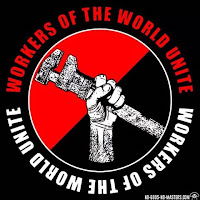William Morris was a 19th-century poet, arts and crafts designer and socialist agitator. He was a revolutionary socialist in the tradition of what might be called “Anglo-Marxism” or “impossibilism” rather than a “proto-Leninist” as he is sometimes depicted to be by the Left.
Morris’s views were that capitalism cannot be tamed, only overthrown, and that any other approach was a diversion from the ‘real task', that the function of a socialist party is to ‘make socialists’ and that anything short of that was a waste of time and effort. Morris did envisage that the changeover to socialism would involve some degree of violence—he introduces this into his description of how socialism came to be established in News from Nowhere—but this was never the essence of what he meant by “revolution” and it is misleading to suggest that Morris was advocating violence as a socialist tactic as opposed to expecting the violence to be started by those opposed to the socialist revolution.
Morris was quite clear about what he meant by “revolution”. As he put it in the opening paragraph of his How We Live and How We Might Live:
“The word Revolution, which we Socialists are so often forced to use, has a terrible sound in most people’s ears, even when we have explained to them that it does not necessarily mean a change accompanied by riot and all kinds of violence, and cannot mean a change made mechanically and in the teeth of opinion by a group of men who have somehow managed to seize on the executive power for the moment. Even when we explain that we use the word revolution in its etymological sense, and mean by it a change in the basis of society, people are scared at the idea of such a vast change, and beg that you will speak of reform and not revolution. As, however, we Socialists do not at all mean by our word revolution what these worthy people mean by their word reform, I can’t help thinking that it would be a mistake to use it, whatever projects we might conceal beneath its harmless envelope. So we will stick to our word, which means a change in the basis of society.”
This is exactly our definition too. “Revolution” means a change in the basis of society, irrespective of whether or not this happens to involve violence. It also implies that this change will be fairly rapid rather than a prolonged, gradual one, so that terms such as “overthrow” and “upheaval” are not out of place. It’s our view the fact that these days, the socialist revolution could be carried out more or less peacefully, with a socialist-minded majority using existing elective institutions to win control of political power and employing this to overthrow capitalism. In other words, we don’t see Morris’s description in News from Nowhere of how socialism came to be established as a likely scenario today.
The Russian revolution but this was never the sort of revolution Morris (or ourselves) advocated. It was a political revolution that led to a social revolution—a change in the basis of society—but from feudalism to capitalism via a prolonged period of state capitalism rather than from capitalism to socialism. Since this was only a change from one class society to another it could be, and was, carried out by a minority some of whose members became the new ruling class.
The sort of revolution William Morris had (and we have) in mind is about a majority revolution from class society to a class-free society, not about a minority revolution from one class society to another. Unfortunately, these latter types of revolutions described themselves as “socialist” and it is their failure to bring about the equality associated with the word “socialism” that has led people to conclude that there is no revolutionary answer and indeed that trying to achieve one will only make things worse. We refuse to accept this defeatist conclusion that we say that Morris’s policy of making socialists is still the most constructive activity that those who want a better world should engage in at the present time.







